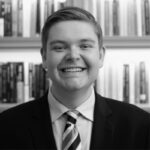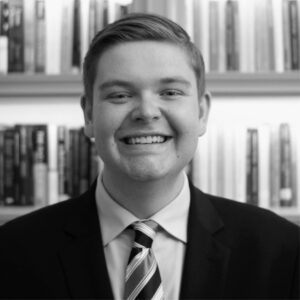As the thick humidity of a Washington, DC summer pushed me to cuff the sleeves of an oversized, freshly pressed dress shirt, I realized I didn’t come to the city to ride the bus. I came for a summer internship.
One of those tedious suit-and-tie, badge-swiping, overly pretentious happy hour things. Granted, looking back, my experiences learning alongside government leaders and think-tank experts was fulfilling in its own right.
Still, nothing quite rivaled what unfolded each morning at 7:34 a.m. on the D74 Metrobus line.
Crouched between reflective handrails and stained cloth seats holding the memories of seasons past, I encountered daily more humanity, more culture, and more reverent wisdom than perhaps ever before. I quickly found myself becoming a student of the city—not of politics, but the city of the people.
Take Mr. Charles, for example.
Each morning, Charles boarded at the corner of Taylor Street NE and Harewood Road carrying two things: a steaming cup of coffee in an insulated tumbler with the logo etching long faded and a tattered red umbrella. Even on days where rain was unexpected, Charles gripped the umbrella, trusting its future protection while using it to support his weight as he sat. Charles worked the night shift.
His shirt was neatly tucked, typically in a pair of black or navy Dickies work pants, no matter the heat.
“Dress for more than just the job you’ve got, but the day you wanna have,” he said to me one morning as I nervously laughed.
Soon he would invite me to sit next to him and recount the stories of his youth in Ghana, almost 5,000 miles from where he sat now as a worn and gritty 60-year-old man.
He told me stories about his mother, down to the last time he hugged her before heading to the United States. I could tell he loved his family. I could tell how hard it was to leave.
One story in particular stuck with me: He shared about a major weather event that left the roof of his home stripped away. He could remember looking up from his mother’s tears to the entire town stepping up to patch the hole. Many contributed beyond what they had themselves. He recounted stories like this often, not because he missed home, but because he believed that we could still have the same unity today here in America.
On the corner of Taylor Street and 9th St NE, a horde of local seminarians boarded, routinely tapping their cards against the monitor in good faith, even though some riders didn’t pay at all.
Often in awe of the quiet peace they carried, I didn’t bother talking to them. Until one morning, as I was reading Ernest Hemingway’s The Sun Also Rises, one of them noted, “There is hope despite despair, friend.”
Have you read it?
“Of course. Haven’t we all struggled to grasp our redemption?”
Soon our morning conversations broke the barrier guarded by their crisp Roman collars and beaded rosaries and led into real fellowship. I found myself asking about vocation in a way like never before, sometimes sitting at my desk hours later still thinking about what I would ask tomorrow.
Gradually I came to understand vocation not as a simple preference but a glorious gift of weight to bear. A gift of weight from God, our wondrous Creator. And this same weight pressed upon the chests of the soon-to-be priests.
More friendly faces began popping up each morning.
A young girl, whose hair never seemed to stray from the tight side ponytail she wore beneath a liberal number of colored bowtie barrettes, sat toward the front each morning. Sometimes she stood even if there were available seats as she pursued an exhaustive effort to flirt with the young and uninterested bus driver.
“Girl, when are you going to give that up?” noted Mrs. DoGood one morning. A name I gave to an elderly woman who also often sat at the front and daily belabored each young person getting off at each stop, “You better do good today!”
The young girl, looking back at the entire bus knowing all her antics, simply stated, “Until I get a date or a restraining order.”
Joyously the bus came alive with laughter and smiles. For a brief moment, each independent weight being carried vanished and the tension was sucked from the iron chamber. Our jobs, our dreams, and our bank accounts still mattered, but for once, not the most.
Mingling cultures, broken English, and the smell ofgreasy breakfast foods, the city bus did more to connect the souls of each of its passengers than any other institution I encountered this summer.
In their own ways, each person taught me something that the city kept me too busy to understand: dignity is local. It can’t be manufactured in prestigous or elite think tanks, committee rooms, or even the most powerful house in the country. It rides the bus with you every morning at sunrise.
There is a temptation in Washington to think abstractly: policy, systems, ideologies. But the bus forced me to look past each of those lenses. It allowed me to see people for who they are, not as symbols or numbers in a study.
I saw humanity in how Mr. Charles often gave up his seat to young girls even after working the night shift. It was there as we all waited patiently for each seminarian to rustle around his bag for his card, even considering we each had a different destination and due date. And, perhaps most evidently, humanity was there in simply saying good morning to each other and asking “how are you doing today?” even though we didn’t have to.
The greatest lesson my experience in Washington taught me is that renewal doesn’t begin with disruption but with simple restoration. What we all need most is restoration of the holy temples we encounter daily, and we can begin this work with neighborliness, humility, and faith.
I heard more truth in the quiet prayers of seminarians than any policy hearing or expert interview. I found more trust in Mrs. DoGood’s morning edict than in any encouragement to keep climbing the ladder of corporate unrest. And arguably, I felt more calling to serve the nation that Mr. Charles once believed in and came to as a 26-year-old with nothing more than a red umbrella, a few hundred dollars, and a crumbled photograph of his mother he looked at daily.
I may have left Washington with fewer answers than when I arrived, but I didn’t leave empty handed. I’ll carry with me for life the peace and hope for our beautiful experience here on earth that I saw each morning. Not the kind you receive when you complete a task, but the kind that comes from knowing you’ve been given something great: the presence of another soul.
As I packed my bags to return home, I thought about my final ride with Mr. Charles and the rest of the characters in my Washington summer. I didn’t feel the need to say goodbye. I didn’t have to. The bus keeps rolling from stop to stop, not seeking to give us closure but merely the chance to sit and learn if we are willing.
And maybe, just maybe, that is what our country needs the most. Not a new direction but the same old route of faith, work, community, and local trust. The kind you can find, if you’re lucky, on the back of a city bus.
Image via Freerange.





